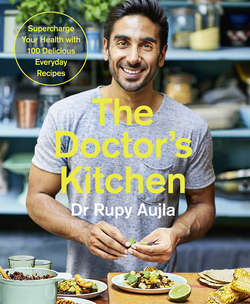Читать книгу The Doctor’s Kitchen: Supercharge your health with 100 delicious everyday recipes - Dr Aujla Rupy, Dr . Rupy Aujla - Страница 13
ОглавлениеWhy I eat ‘plant-focused’
On social media people often mistake me for a vegetarian or vegan because I get so excitable about vegetables. I do actually eat all types of meat and fish but I focus my diet around plants.
Rest assured there is logical reasoning underpinning my enthusiasm for chicory, cabbages and – of course – the greens! Abundant in vitamins and minerals, everybody generally knows they’re ‘good for us’, but the story goes a lot deeper.
Phytochemicals, the chemicals found in plants, are another explanation for the incredible health benefits of fruits and vegetables.20 These are what give plants their pigment, smell and, importantly, flavour.21 It’s the study of these chemicals that ignited my passion for nutritional medicine. A number of research papers look at their effect on inflammation,22 bone health23 and even cancer.24 We have only scratched the surface when it comes to investigating just how influential these thousands of bioactive compounds are to human health. But, looking at the associations between food and disease, the positive impact of diets largely based on plants and whole foods is indisputable.25 This is why they make up the bulk of my daily plate and why they should feature heavily on yours, too.
Eat mostly plants and you’ll stand a better chance at living a healthier, more vibrant and fulfilling life, free of disease.
These compounds exist in a multitude of produce that is commonplace in grocery stores nationwide. Everything from a simple carrot to your basic apple is brimming with phytochemicals like quercetin and carotene.26 These simple, affordable and accessible ingredients are key to good health. What’s more, eating plates of a variety of colourful plants is the easiest way to guarantee a complete range of these phytochemicals,27 which is why my dishes appear so vibrant. Using a multitude of herbs and spices (which have their own health benefits) to complement the ingredients is an easy undertaking for a home cook once you know how.
Having sifted through piles of studies involving thousands of people (followed up for years) and experiments examining the biological mechanisms behind the health-promoting effect of food, I can tell you the evidence is convincing. You can lower your risk of stroke, cancer and heart disease by increasing your fruit and vegetable intake.28,25,29,30 Eat mostly plants and you’ll stand a better chance at living a healthier, more vibrant and fulfilling life, free of disease.
I enjoy animal protein of all varieties – fish, poultry, chicken, game and beef – about once or twice a week. Animal products are an easy and delicious source of complete proteins. Key micronutrients such as zinc and vitamin B12 are nutritional qualities very hard to obtain in purely plant-based diets.31 But, I see meat and animal products as a luxury item in the same way our ancestors would have treated them.32,33
On the subject of meat, I do have concerns about the harmful effects of cheaper mass-produced livestock on our health and the environment. On balance, a stressed, improperly reared animal is not likely to be good for us despite the benefits of convenient protein and nutrients. The type of feed, use of medications and the space an animal has been allowed to roam in all have an impact on their health and can negatively impact ours.34
The most well-studied diet we have access to has examined the eating habits of thousands of patients over decades. That is the Mediterranean diet. I am unapologetic for it not being a new, sexy, alternative eating plan that will grab headlines. Instead, it’s solid, evidence-based nutritional advice about how the majority of us would benefit from eating.35 It’s a launch-pad to start a healthy lifestyle journey, I know it’s safe and … it’s actually quite vegetarian! It doesn’t mean piles of pasta, bread and quick-releasing carbohydrates. It focuses on plant-based sources of protein and fibre, such as nuts and legumes, good-quality fat and a limit on meat intake.36
Eating based on the principles of a Mediterranean diet is a good starting point, and is one I personally follow. For these science-grounded arguments, I think focusing meals around plants is a good, well-established entry point for most people.
Instead of pushing a particular dietary dogma I want to encourage you to choose a fitter lifestyle by tempting your taste buds rather than making you eat vegetables because you feel you ought to. This way of eating doesn’t have to be boring. I’m using the principles of this diet to create enticing multi-ethnic dishes that you can tweak according to your preferences. This journey is not limited in its culinary scope and I hope to show you why it’s also medicinal.
Plant-based protein
As I eat a largely plant-based diet I’m all too familiar with the question, ‘So where do you get your protein from?’ It’s imperative to bring attention to all the amazing sources of plant-based protein available to us. A more pressing public health concern is actually the lack of nutrient density in our diets, not to mention a lack of fibre. Fortunately, plants that are high in protein also have a large amount of fibre and a wealth of other health-promoting plant chemicals. I still enjoy meat and fish, but the majority of my protein comes from a selection of these wonderfully delicious plant sources. Here are some of my favourites.
